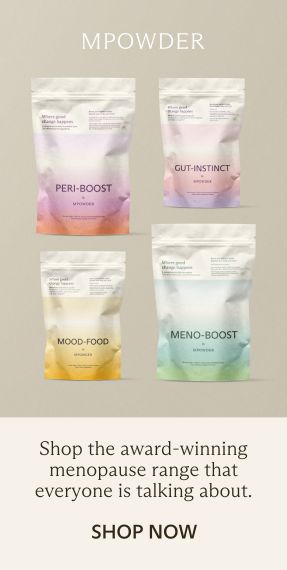Hormone Replacement Therapy (HRT) can be transformative for many women navigating menopause. But for others—due to health conditions, risk factors, or personal choice—it may not be an option. But that doesn't mean you have to face menopause symptoms alone. There is growing evidence to support a layered approach that blend lifestyle with diet and smart supplementation too.
Let’s explore five of the most studied and accessible approaches available today.
Cognitive Behavioural Therapy (CBT)
- Originally developed to treat anxiety and depression, Cognitive Behavioural Therapy has been shown to reduce the severity and frequency of menopausal symptoms—especially hot flashes, night sweats, mood swings, and sleep disturbances.
- A 2019 systematic review in BJOG concluded that CBT was effective in reducing the distress caused by vasomotor symptoms (hot flushes and night sweats), as well as improving sleep and overall wellbeing.[¹]
- CBT does not change hormone levels, but it helps reframe the body’s response to symptoms, decreasing their impact.
- How to try it: Seek out a CBT therapist with experience in midlife health, or explore self-guided digital CBT programmes developed specifically for menopause.
Acupuncture
- Acupuncture, a core practice in Traditional Chinese Medicine, has increasingly been studied for its impact on menopause symptoms—particularly hot flashes and mood regulation.
- A 2023 meta-analysis in BMJ Open found that acupuncture significantly reduced the frequency and intensity of hot flushes and improved sleep and anxiety in perimenopausal and postmenopausal women.[²]
- Researchers suggest acupuncture may help modulate neurotransmitters and stimulate endorphin release, supporting temperature regulation and mood balance.
How to try it: Look for a licensed acupuncturist with experience in women’s health or menopause support. Or reach out to our health concierge team, and their list of recommended practitioners.
Ashwagandha
- Adaptogens like Withania somnifera (Ashwagandha) help the body manage stress and support hormonal balance. In menopause, elevated cortisol levels can worsen symptoms such as anxiety, poor sleep, fatigue, and weight gain. Ashwagandha helps regulate this stress response.
- A 2021 randomised, placebo-controlled trial published in the Journal of Obstetrics and Gynaecology Research found that ashwagandha significantly improved sleep, hot flushes, and mood in perimenopausal women.[³]
- Additional studies confirm its effect on lowering cortisol, enhancing sleep quality, and improving resilience to stress.
- At MPOWDER, we include KSM-66® ashwagandha in Mood-Food, a formulation co-created with our community to support mental clarity, calm, and hormone health.
As always, speak to your healthcare provider before introducing ashwagandha or any supplement, especially if you have thyroid concerns or are on medication.
Prebiotics (and Gut Health)
- The gut plays a central role in hormone metabolism and inflammation regulation. During menopause, changes in oestrogen levels can disrupt gut microbial balance, affecting everything from mood to immunity.
- Prebiotics—non-digestible fibres that feed beneficial gut bacteria—can help restore microbial diversity. A 2020 study in Nutrients highlighted that dietary prebiotics significantly improved gut barrier integrity and systemic inflammation markers in menopausal models.[⁴]
- Prebiotic support may also improve the metabolism of phytoestrogens, helping the body make better use of plant-based oestrogenic compounds from foods like flaxseed and legumes.
- Our GUT-INSTINCT blend includes ACTAZIN® green kiwi powder, slippery elm, and marshmallow root to support digestion, reduce bloating, and nourish your microbiome.
As with all supplements, please consult your doctor before use, particularly if you are on medication or managing a digestive condition.
The Mediterranean Diet
- The Mediterranean diet is rich in fibre, healthy fats, and antioxidant-rich whole foods. Research consistently shows its benefit in reducing inflammation, supporting heart health, and improving metabolic function—areas often compromised during menopause.
A 2022 review in Frontiers in Nutrition found that adherence to the Mediterranean diet correlated with fewer vasomotor symptoms, better mood, and improved cardiovascular markers in menopausal women.[⁵] - The inclusion of omega-3s, polyphenols, and phytoestrogenic foods supports hormone balance naturally.
- How to try it: Focus on plant-based diversity—leafy greens, legumes, whole grains, nuts, and extra virgin olive oil—alongside moderate fish and minimal processed foods.
Final Thoughts
HRT can be a powerful option for those who can take it. But for many, menopause without HRT is a reality—and one that can still be supported with natural, evidence-based alternatives that still ensure you stay well and make part 2 all that you want it to be. Listen in. Read the research. Apply interventions with curiosity. And work out what is right for you.
Before making changes, always consult a qualified health professional—especially if you are managing an existing health condition or are on prescribed medication. No supplement or practice should be seen as a replacement for professional advice.
References
[1] https://www.ncbi.nlm.nih.gov/books/NBK609725/
[2] https://pmc.ncbi.nlm.nih.gov/articles/PMC11992344/
[3] https://pubmed.ncbi.nlm.nih.gov/34553463/
[4] https://pmc.ncbi.nlm.nih.gov/articles/PMC9974675/
[5] https://pmc.ncbi.nlm.nih.gov/articles/PMC11490460/
Share Twitter Facebook Pinterest

